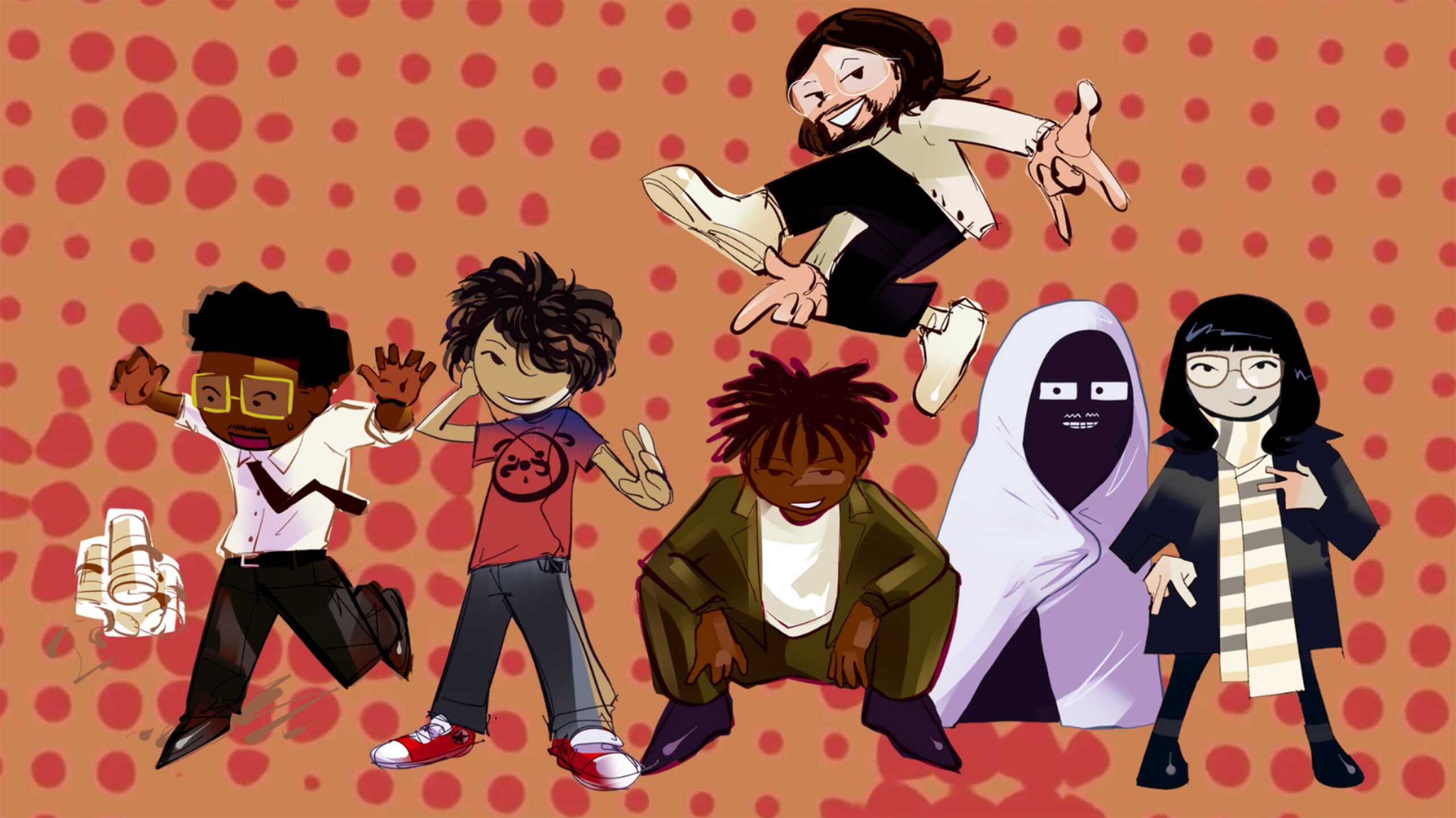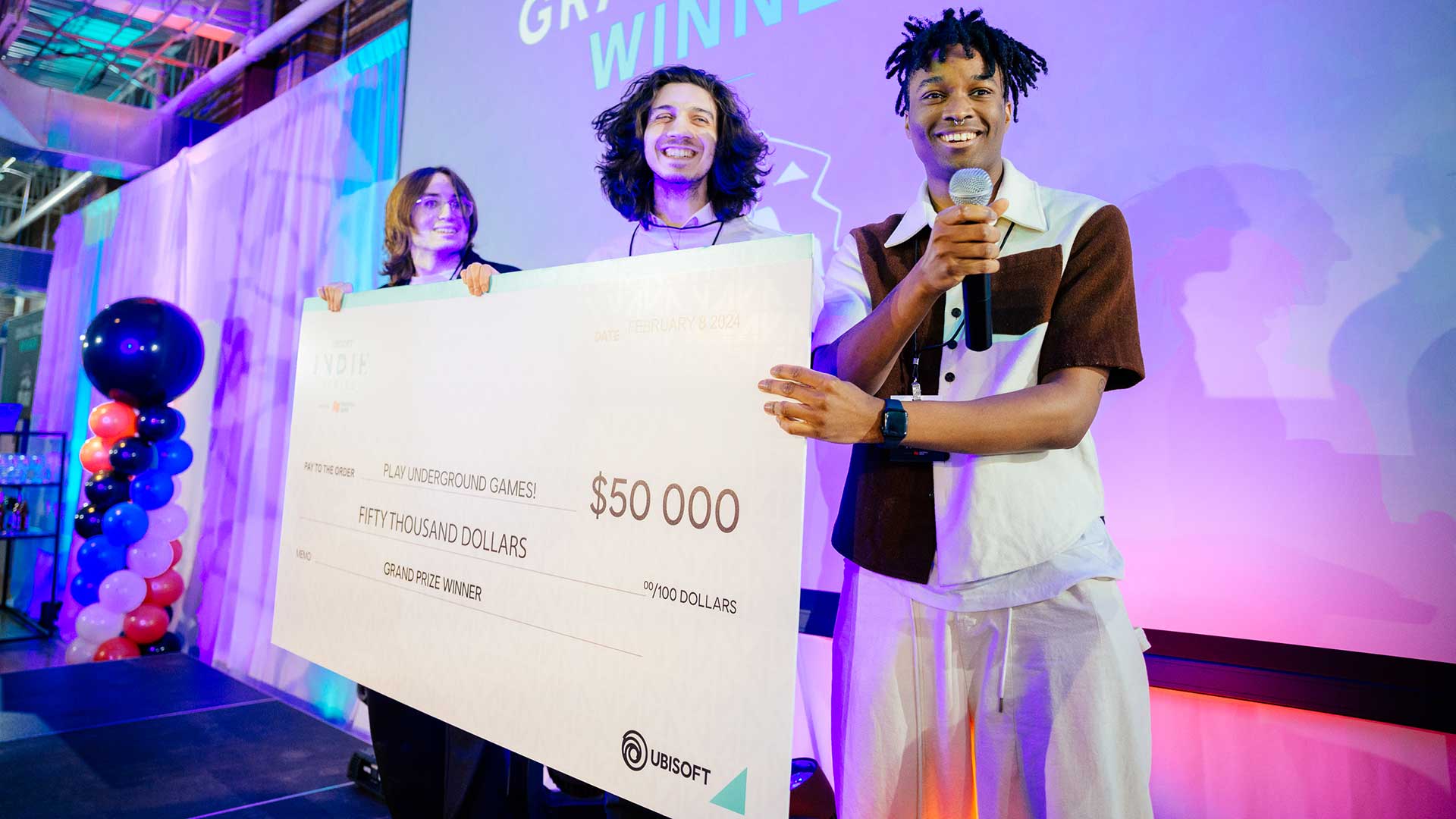
Funké Joseph has worn many hats in the gaming space.
Editor-in-chief of the youth DIY magazine Play Underground. Music producer in the pop duo Catdog. Games media at the likes of IGN, GameSpot and Fanbyte. Creative producer and communications at the publisher Focus Entertainment on titles like Plague Tale: Requiem and Aliens: Dark Descent.
Now, the 25-year-old multihyphenate, who is non-binary and uses they/them pronouns, is branching out into making games of their own. Last September, Joseph and two friends, fellow Catdog member Jyudeh J-Max Jarrett and their magazine collaborator Farouk Kannout, started the Toronto-based indie studio Play Underground Games (PUG).
They soon brought on August Polite (animator and background artist), Haven Daniels-Taylor (character artist) and Danika Harrod (marketing and community). Altogether, the team is entirely made up of LGBTQ+ and BIPOC creators who want to tell stories centred around people of diverse identities.

Some of the Play Underground team. From left to right: Farouk Kannout, August Polite and Funké Joseph. Image credit: Ubisoft Toronto
“I’ve been working in the games industry for a while, and I’ve been doing journalism, and I got a bit disillusioned with it,” says Joseph of the decision to make a career change. “It was sucking out the fun of what I liked about games.”
They note that there’d always been a belief that they couldn’t make games, but that dissatisfaction in games media ultimately inspired them to take a chance on development. As a team, PUG took the ‘Future Forwards’ course from the Toronto-based indie developer non-profit Hand-Eye Society to learn how to run a sustainable studio.
That whole experience eventually led the team to apply to take part in the Ubisoft Indie Series, an annual competition put on by veteran developer Ubisoft Toronto (Far Cry 6) to receive funding and mentorship opportunities. While some of their competitors, like 13AM (Dawn of the Monsters), had already released one or multiple games, PUG was going into the Indie Series mere months after its formation, let alone putting out a title. “It was a bonkers experience that really threw us into the fire,” admits Joseph.
And yet, the team’s yet-to-be-announced debut game clearly impressed Ubisoft jurors, with PUG taking home the Grand Prize out of five finalists during the February 8th ceremony. Alongside that honour comes with $50,000 in funding and mentorship opportunities from Ubisoft and National Bank.
🏆👏 Congrats once more to 2024 Indie Series Grand Prize Winner @pugonline & @nationalbank Special Prize Winner @13amgames!
Missed out on the action? Catch the full Indie Series recap ➡ https://t.co/OiIuawqG2P pic.twitter.com/e12pZgpfHw
— Ubisoft Toronto (@UbisoftToronto) February 22, 2024
“We’ve worked together for free for fun, so to be able to be getting paid for that is actually mind-blowing to me,” they admit. “It still hasn’t really set in, until we start doing a few of the things. I feel like in a month, it’ll actually hit. But right now, I’m so proud of them for doing that! We’re putting it together, and I’m like, ‘We actually did that!’ We did it.”
They note that the win was also an “external validation” that the team was on the right path. “But to see people believe in us, as well as our networks and our communities and our families, and say, ‘Hey, I’m excited for this,’ really just helps us all.”
For Joseph, that whole journey has truly opened their eyes to the possibilities of game development.
“It educated us in so many things from all aspects of games but specifically, talking to the people from Ontario and around the world, realizing that it’s possible to do — not just as a portfolio piece or a hobby, but as a sustainable business that is also creative.”
As for the award-winning project itself? Joseph says PUG isn’t ready for a full unveiling just yet, but they did confirm in an interview with Interactive Ontario’s The Lodgge that it’s about “the joy and anguish of creating music.” The decision for that premise, Joseph says, came from everyone on the team having backgrounds in music ranging from professional bass clarinet and songwriting to rap and garage music pop. Joseph specifically shouts out Jyudeh J-Max Jarrett, who is also non-binary and uses they/them pronouns, for their prolific musical talent.
Hey y'all – We're Play Underground Games!
We're a small, diverse team of creators working on a game we think is REALLY awesome, and we think you'll love it too!
We recently won @UbisoftToronto's Indie Series grand prize for our game pitch and can't wait to share more SOON! pic.twitter.com/4vvGDYgccy
— Play Underground Games! (@pugonline) February 19, 2024
“It influences how they can create and how they think about just whipping up a song in like five minutes that is just so catchy that we’ll just be singing it for the week,” they say. “And that’s why we leaned into it — we want to lean into our strengths, which are writing sound and art. And music is at the core of that because we all love music.”
While Joseph can’t say more about PUG’s project yet, they are much more open about the team’s overall goals as a studio. As both a Black and non-binary person, Joseph says they want PUG to help support others to make games. A key part of that, they say, is creating and uplifting diverse teams.
“I realized that the representation that matters is happening behind doors. The people that are on the team are the representation I want. [Diverse] characters [in games], yes, of course, that means something. But from studying more and from writing these pieces about Animal Crossing and Elden Ring, I’ve noticed that the stuff that actually matters is just having the creatives that are Black and are of these different backgrounds have the chance to create these stories, because they historically have not had the chance.”
Joseph notes that bringing in more diverse creators will also result in greater diversity in the types of games being made.
“I think it would be really fun, and we’d have so many stories that you’re just like, ‘Whoa!’ especially if they’re coming from a non-video game background and they’re a young adult getting into games, I want to play that game because I know it’s not going to have any of the biases or common conceptions and practices of game dev that has been throughout the past few years. So it’s going to be different in some way, and I like different — I want more different stories.”
Of course, that means getting more diverse creators into the industry, and Joseph says there are several ways through which companies should aim to do that.
To start, they suggest that you apply to as many places as possible, even if you don’t initially feel confident.
“There are so many people that are applying that just have that built-in confidence from having whiteness as a power card or being a man as a power card who just feel comfortable applying even if they don’t fit that correct job description and those responsibilities — they can’t do that. Whereas people who historically don’t have those power cards can’t feel comfortable applying to that.”
They also say that diverse hiring should be considered early on, especially when creating stories about characters from different backgrounds. “From team conception, trying to either have the core team have diverse backgrounds, or have the core team be researched and constantly researching and diverse backgrounds, having a team of consultants from different backgrounds you can talk to and get real experiences from if you’re writing about a specific experience…” they explain.
“So much of the stuff I’ve learned, I’ve learned from like a Zoom call or like a random message from someone else in the industry who I’ve worked at a publication with or met at some event, and that information just isn’t available. So I’ve taken it upon myself to share it with friends who are even interested in game dev,” they say.
“I’ll make the time. And if you make the time, it makes a world of difference. I think of all the people that helped me with leadership and narrative help and just game development help when we started working on our game and I just don’t think I would feel as comfortable and as confident without that. So for professionals that are in the industry if they can’t hire other people: make the time to care about another person and help them get welcomed into this really cool space that’s shrouded in shadows.”
thank u e-fam for all the support i cannot wait to for y’all to see what we’re working on ❤️🔥 <- a real picture of my warm heart
— ☆fūnk-é (@funkefly) February 11, 2024
Ultimately, they suggest that those with any interest in games even start small, like watching YouTube videos. From there, you can look into some of the mentorship and funding opportunities available in Canada, such as the aforementioned Hand-Eye Society.
They look back on their own positive experiences in just a handful of months with PUG.
“It was fun to execute everything we’ve learned, and we’re still learning. It’s great to meet all of the devs from Toronto and the people in my network who have spoken to me and made the time to call and just answer my questions and hear me vent. It really helped me communicate with my team that this was possible,” they said.
“Once they started believing, too — once it clicked that we can actually do this — it’s been unstoppable. It’s a shining light that I feel we’re floating in, and I just want to spread this around the industry, lift up other people who maybe didn’t realize games were possible and had this imaginary barrier like I did, and commission them for work — just show them it’s possible to do.”
This interview has been edited for language and clarity.
Image credit: Ubisoft
MobileSyrup may earn a commission from purchases made via our links, which helps fund the journalism we provide free on our website. These links do not influence our editorial content. Support us here.


